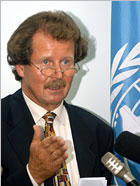
Torture is quite systematic in Nepal: Nowak
Kathmandu, Sept 16 - Wrapping up his weeklong Nepal visit, UN Special Rapporteur on torture, Manfred Nowak today said that torture and ill-treatment is systematically practised in Nepal by the police, armed police and the Royal Nepalese Army to extract confessions and to obtain intelligence, among other things, from suspected Maoists.
He also said he even received "repeated and disturbingly frank" admissions from senior police and army officials that torture was acceptable in some instances, and was indeed systematically practiced.
Speaking to journalists at a press meet, Nowak revealed some disturbing torture methods practiced by the security forces including beatings with bamboo poles and plastic pipes, kicking with boots, electric shock to the ears, rolling rods over the thighs, jumping on thighs and legs, maintenance of stress positions, hanging upside down on a pole and beating on the soles of the feet and blindfolding and handcuffing "suspects" for prolonged periods.
He also urged the government to review existing legislations, including the Terrorist and Disruptive Activities Ordinance (TADO) and the Public Security Act, that "effectively provide the police and the army with sweeping powers to detain suspects" for preventive reasons, sometimes for months on end.
He, however, informed that he did not receive any major complaints of torture in jails- the Central Jails in Nepalgunj and Kathmandu he visited. "The conditions in jails are not inhuman if the general situation in Nepal is taken into account," Nowak said.
He also mentioned receiving some shocking evidence of torture and mutilation carried out by the Maoists to intimidate, extort money and punish non-cooperation. Maoist methods of torture, according to Nowak, include beatings with sticks on the legs, piercing of legs with metal rods, beatings with rifle butts on ankles, and even mutilation, such as amputation of toes.
To discourage the widespread use of torture, the UN Special Rapporteur urged the government to make a clear public statement against the prevailing culture of impunity. "Torture is not a criminal offence in Nepal which is against the Convention against Torture which Nepal, too, has ratified," Nowak said stressing on the need to fight impunity.
Saying that the Torture Compensation Act-1996 does not provide for effective remedies against the crime, Nowak termed the "disciplinary action" taken against the perpetrators of torture such as demotions, suspensions, fines, delayed promotions as "grossly inadequate."
"I haven't received any case where police and armed police guilty of committing torture have actually been brought to justice," Nowak said. He also urged the Maoists to end torture.
Nowak, who arrived in Kathmandu on September 10 on the invitation of the Nepal government, visited a number of government detention centres including the Central Prison, district police offices in the Kathmandu Valley, those in the army barracks and jails during his stay.
Over the course of the visit, Nowak held meetings with top government officials including the chief and joint secretaries of the Office of the Prime Minister, the attorney general, the home minister and secretary, chief justice of the Supreme Court, the inspector generals of Nepal Police and Armed Police Force, senior army officials, NGO activists and detainees and prisoners in different detention centres.
Nowak will submit a comprehensive written report on his findings to the UN Commission on Human Rights at its 62nd session next year.
No comments:
Post a Comment